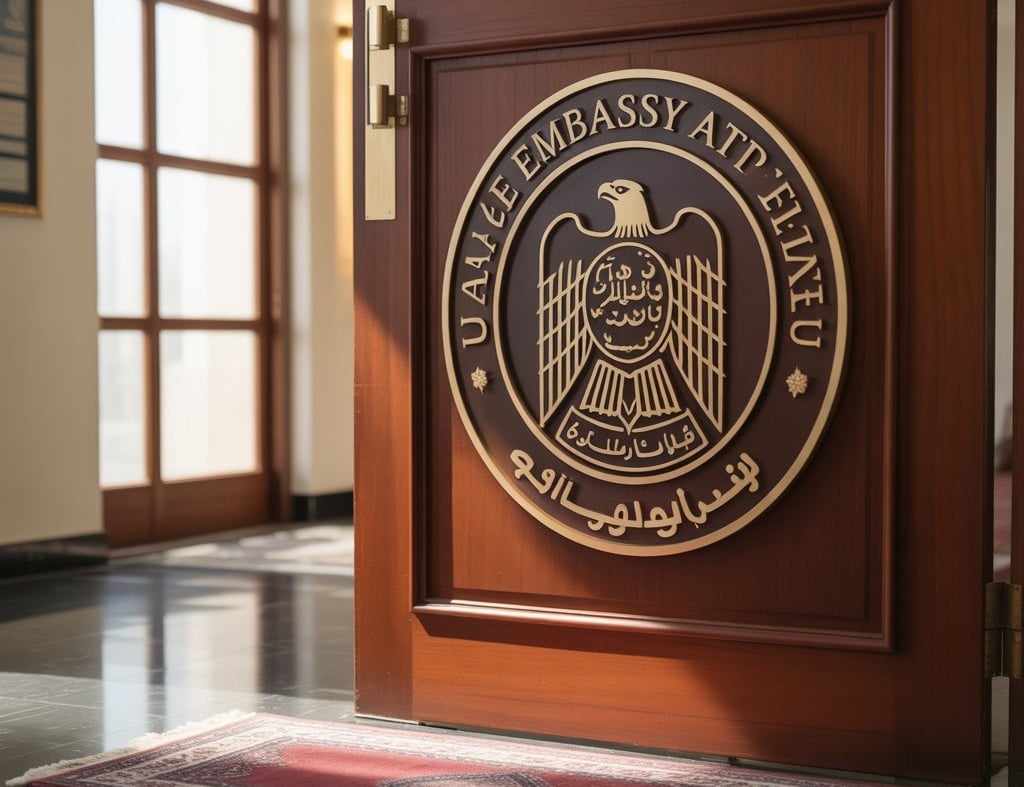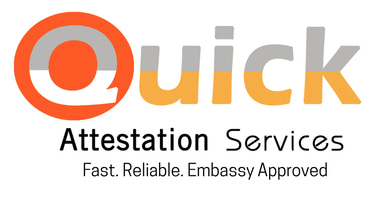UAE Embassy Attestation Guide for Certificates
Discover the essential steps and documents required for UAE embassy attestation of birth, marriage, and educational certificates. Ensure your documents are valid and recognized with our comprehensive guide.
9/17/20257 min read


Understanding UAE Embassy Attestation
Embassy attestation is a vital procedure that serves to validate the authenticity of official documents, including birth, marriage, and educational certificates. This formal process is essential for individuals seeking to establish legal recognition of their documents within the United Arab Emirates (UAE). By undergoing embassy attestation, the documents are certified as legitimate, which is crucial for a variety of legal, educational, and personal purposes when residing or evaluating opportunities within the UAE.
The primary purpose of embassy attestation is to ensure that foreign documents meet the compliance standards set by the UAE government. This involves a thorough verification process that extends beyond the initial issue of the document, confirming its validity at multiple levels. From the point of origin to the final attestation by the UAE embassy, this procedure provides a layer of assurance to authorities that the presented documents are genuine and can be trusted for official use.
When it comes to specific requirements, several documents need to undergo attestation before they can be accepted by UAE institutions. Birth certificates should be issued by an authorized registry, marriage certificates must be registered and certified by the relevant authorities, and educational certificates should be attested by the issuing educational institution as well as the education board. Each of these documents may require additional legalization steps, such as notarization or apostille, depending on the originating country’s regulations. Understanding these requirements is paramount for expatriates and locals alike to facilitate a smooth transition or process within the Gulf region.
Types of Certificates Requiring Attestation
UAE embassy attestation is an essential process for various certificates to ensure their credibility and authenticity in the United Arab Emirates. Among the numerous documents that require this form of validation, three primary categories stand out: birth certificates, marriage certificates, and educational certificates. Each of these documents serves a specific purpose and is critical when aiming to pursue residency applications, employment opportunities, or further education in the UAE.
The first type, birth certificates, must be attested for expatriates wishing to apply for residency or sponsor family members. This attestation verifies the child's identity and parentage, fostering trust and reducing fraudulent claims during the visa application process. To attestate a birth certificate, necessary documents typically include the original birth certificate, a copy of the parents’ passports, and marriage certificates if applicable.
Marriage certificates are another pivotal type of document needing attestation. This is particularly crucial for expatriates applying for residency or family visas in the UAE. An attested marriage certificate serves as proof of a legal union and is vital in situations involving spousal sponsorship or joint property ownership. To have a marriage certificate attested, individuals usually need to present the original document along with valid identification for both spouses.
Lastly, educational certificates require attestation for individuals seeking employment or further studies in the UAE. Employers and educational institutions demand this verification to ensure that the qualifications claimed by applicants are genuine. The types of educational certificates commonly attested include diplomas, degrees, and transcripts. Required documents for this process generally encompass the original educational certificates, marksheets, and in some instances, a good conduct certificate from previous educational institutions.
The Attestation Process: Step-by-Step
The attestation process for documents intended for use in the UAE can be intricate, yet following a structured approach can simplify the journey. Start by determining the documents that require attestation. Common items include birth certificates, marriage certificates, and educational certificates. Once identified, the initial step is to obtain notarization. Notarization serves to confirm the authenticity of the documents and must be conducted by a registered notary public.
Next, the documents must secure approval from the relevant government authority. For educational certificates, this usually involves having the document attested by the respective education department or Ministry of Education in the issuing country. For vital records, such as birth or marriage certificates, the document may need to be endorsed by local civil registry offices or the appropriate body responsible for record-keeping.
After securing the necessary approvals from local authorities, the next phase involves submitting your documents to the UAE embassy or consulate. It is important to visit the official website of the respective UAE diplomatic mission to gather specific details about the submission process, including the required forms, submission fees, and processing times.
When preparing for submission, ensure that you have all pertinent documents compiled, including originals and copies, alongside a completed application form that may be required by the embassy. Poorly organized submissions can lead to delays, hence attention to detail at this stage is paramount. Additionally, check if any other documents are needed for specific attestations, such as identification proof or proof of residency.
Upon submission, the embassy will process your attestation request, which may take several days to complete. Stay informed by following up with the embassy if necessary. Successfully navigating this step-by-step process of document attestation will ensure that your birth, marriage, or educational certificates are recognized for use in the UAE.
Required Documents for Attestation
The process of obtaining UAE embassy attestation for birth, marriage, and educational certificates requires a thorough understanding of the necessary documentation. The following list outlines the key documents that individuals must prepare to ensure a smooth attestation process.
First and foremost, the original certificate that needs to be attested is crucial. This could be a birth certificate, marriage certificate, or an educational qualification, depending on the individual's needs. In addition to the original document, it is advisable to have multiple photocopies of these certificates, as embassies may require these for their records.
Furthermore, identification documents must accompany the certificates. Typically, a valid passport and a recent passport-sized photograph are required. These identification documents serve to verify the identity of the individual requesting the attestation, making them indispensable in the submission process.
It is also important to note that any documents not originally produced in English or Arabic need to be translated accurately. A certified translation is mandatory, as the UAE embassy will only accept documents in these languages for the attestation process. Having the translation performed by a recognized service ensures compliance with embassy standards.
Moreover, for documents issued in certain countries, additional paperwork may be necessary. This could include a No Objection Certificate (NOC) from the relevant authority or an attestation from the Ministry of Foreign Affairs in the issuing country. Individuals should check with the UAE embassy to confirm any country-specific additional documents that may be needed.
Preparing all required documents meticulously will facilitate the attestation of birth, marriage, and educational certificates, leading to a more efficient processing time. Ensuring all documents are in order is essential to avoid delays and complications during this crucial administrative process.
Estimated Timeframe and Fees for Attestation
Attestation is a critical process for individuals seeking to validate their documents for official purposes in the UAE. Understanding the timeframe and associated fees is essential for efficient planning. Generally, the overall attestation process for birth, marriage, and educational certificates can take anywhere from a few days to several weeks, depending on several variables such as the type of document and the originating country.
The first step in the attestation process is obtaining the necessary documentation from the relevant local authority or education institution. This stage can take approximately 1 to 5 business days. Following this, the documents must be submitted to the relevant embassies or consulates for verification, which typically takes an additional 3 to 10 business days. It is crucial to check specific embassy requirements, as some may have different processing times.
After the embassy procedures, the final step involves obtaining the UAE Ministry of Foreign Affairs and International Cooperation (MoFAIC) attestation. This final step usually takes around 1 to 3 business days. Therefore, the entire attestation process can be expected to range from 7 to 20 business days, factoring in potential delays due to holidays or increased demand.
In terms of financial implications, the costs associated with document attestation can vary greatly. Basic attestation fees may range from AED 200 to AED 600 per document, depending on the document type and the respective embassy or consulate fees. If individuals choose to utilize third-party services to assist with the attestation, additional service fees might range from AED 150 to AED 1,000. Understanding these costs helps in budgeting for the attestation process effectively.
Common Challenges and Solutions
The attestation process for certificates such as birth, marriage, and educational documents can be fraught with various challenges. One common issue individuals face is paperwork errors. These errors can arise from incomplete forms, incorrect notarization, or missing documents. To mitigate this, it is advisable to double-check all submissions and ensure that every document is accurate and complete. Engaging a professional service that specializes in embassy attestation can also help in minimizing the likelihood of such errors, as they are adept at understanding the specific requirements of different embassies.
Another frequent challenge is delays in processing times. Individuals might experience longer than anticipated waiting periods due to high volume submissions or bureaucratic inefficiencies. To address this, it is recommended to begin the attestation process well in advance of any deadlines or travel plans. Additionally, maintaining regular communication with the embassy can provide insights into the status of applications and potential delays, allowing individuals to adjust their plans accordingly.
Misunderstandings with embassy requirements can also complicate the attestation process. Different embassies have unique stipulations regarding documentation and approvals, which can lead to confusion. It is essential to thoroughly research the specific requirements for the relevant embassy before submitting any documents. Resources such as official embassy websites or legal consultants can be invaluable for clarifying any uncertainties. Keeping a checklist of necessary requirements can also streamline the process and minimize chances of miscommunication.
In summary, while the attestation process can present various challenges, being proactive and informed can significantly alleviate these issues. Through careful preparation and utilizing available resources, individuals can navigate the complexities of the UAE embassy attestation process with greater ease.
Conclusion and Additional Resources
In conclusion, the process of UAE embassy attestation for documents such as birth, marriage, and educational certificates is a critical step for individuals seeking legal recognition of their documents in the United Arab Emirates. Attesting these documents ensures their authenticity and compliance with local laws, facilitating various legal processes such as residency applications, employment, and other essential services. The importance of proper attestation cannot be overstated, as failure to adhere to the necessary legal protocols may result in document rejection or complications in legal matters.
Throughout this guide, we have provided a detailed overview of the steps involved in obtaining attestation, including the prerequisites, required documents, and the specific roles of various entities such as the Ministry of Foreign Affairs and the respective embassies. Additionally, we have highlighted the importance of utilizing reliable attestation services to help streamline the process, alleviate stress, and ensure that all paperwork meets the UAE's stringent requirements.
For readers looking to pursue attestation for their documents, we encourage you to take advantage of the resources available to assist you in this endeavor. Websites such as the official UAE Government Portal and the Ministry of Foreign Affairs provide extensive information and guidelines on the attestation process. Furthermore, contacting your respective UAE embassy can yield valuable assistance related to specific inquiries. It may also be beneficial to connect with professional agencies specializing in document attestation, which can offer expert advice and help you navigate potential complexities.
By following the guidelines outlined in this comprehensive guide and leveraging the provided resources, individuals can proceed confidently in securing the necessary attestations for their important documents. Such preparation not only facilitates a smoother transition into the UAE legal framework but also ensures that your documents hold validity across all relevant authorities.
